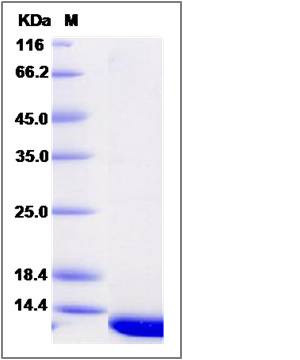Human PDRG1 / C20orf126 Protein (His Tag)
C20orf126,PDRG
- 100ug (NPP2390) Please inquiry
| Catalog Number | P14143-H07E |
|---|---|
| Organism Species | Human |
| Host | E. coli |
| Synonyms | C20orf126,PDRG |
| Molecular Weight | The recombinant human PDRG1 consists of 148 amino acids and predicts a molecular mass of 17.3 KDa. It migrates as an approximately 12 KDa band in SDS-PAGE under reducing conditions. |
| predicted N | His |
| SDS-PAGE |  |
| Purity | > 95 % as determined by SDS-PAGE |
| Protein Construction | A DNA sequence encoding the human PDRG1 (Q9NUG6) (Met1-Gly133) was expressed with a polyhistidine tag at the N-terminus. |
| Bio-activity | |
| Research Area | Cancer |Cell cycle |Cell Differentiation |
| Formulation | Lyophilized from sterile PBS, 10% Glycerol, pH 7.4. 1. Normally 5 % - 8 % trehalose and mannitol are added as protectants before lyophilization. Specific concentrations are included in the hardcopy of COA. |
| Background | PDRG1, also known as C20orf126, belongs to the prefoldin subunit beta family. It is predominantly expressed in normal testis and exhibits reduced but detectable expression in other organs. PDRG1 may play a role in chaperone-mediated protein folding. PDRG1 is overexpressed in tumors relative to normal tissues. Its expression is upregulated in multiple malignancies including cancers of the colon, rectum, ovary, lung, stomach, breast and uterus when compared to their respective matched normal tissues. Thus PDRG1 is a high-value novel tumor marker that could play a role in cancer development and/or progression. |
| Reference |
